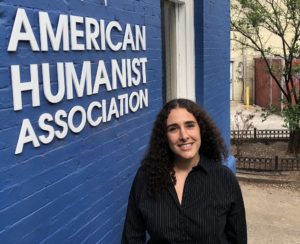Meet the New AHA Staff Member: Isabella Russian

Please welcome the AHA’s new Policy Coordinator, Isabella Russian!
TheHumanist.com: What is your educational and work background?
I attended Arizona State University, receiving a Bachelors degree in Political Science, a minor in Justice Studies, and a certificate in Human Rights. While pursuing my degree, I enjoyed hiking, kayaking, and camping with the university’s Arizona Outdoors Club and raising awareness about poverty, hunger, and injustice issues with Oxfam at ASU.
I began my journey into policy work as an intern with the ACLU of Arizona, and furthered my understanding of governmental processes and legislation with the Arizona State Legislature as nonpartisan staff. Since moving to Washington, DC, I have worked with Congress and with a refugee resettlement effort.
TheHumanist.com: How did you first learn about humanism?
Humanism as a term was something I was only vaguely familiar with when mentioned in secular spaces, however, I became more acquainted with it when I witnessed my state representative receive pushback for giving a humanist invocation as opposed to a non-secular one. Witnessing her experience, I learned the importance of non-belief advocacy and awareness.
TheHumanist.com: Did you grow up in a traditional religious faith? How did it impact you?
I was not raised with religious influence. The absence of religion in my upbringing did not beget any negative impacts, and I did foster a curiosity into others’ upbringings, activities, and the comfort brought to them through their faiths.
TheHumanist.com: What interested you most about working for the American Humanist Association?
Due to there being a plethora of social justice and human rights issues that need addressing, and the interconnected nature of these issues, I had trouble deciding where to dedicate my efforts. I was attracted to the outlook and philosophy of the American Humanist Association, and how it embodies an ethical vision that seeks to address the issues I want to work on improving.
TheHumanist.com: What book has influenced you the most?
While many books have had an impact on my life in some way or another, two that particularly stand out are A Thousand Splendid Suns by Khaled Hosseini and Zeitoun by David Eggers. The former floored me and reinvigorated my understanding of the importance of defending and advancing women’s rights, and the latter, while perhaps a bit controversial now, was moving insight into the diverse discriminative experiences minority communities face during disaster.
TheHumanist.com: If you could have dinner with any three people in the world (living or dead), who would they be and why?
My great grandfather Hrant Russian, whom I never had the fortune of meeting, escaped the Armenian Genocide and defied death three times in the process—including a shot to the head. While I am lucky to read his story in a book my great-aunt transcribed from tapes he recorded before his passing, I would love to meet him, hear his story firsthand and thank him for raising my awesome grandpa. At the table would also be my mom’s parents, whom I also never had the fortune of meeting, so that I could connect with my Algerian roots and understand their roles as community leaders.
